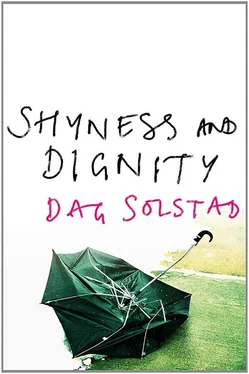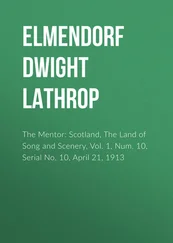Only after midnight did Johan Corneliussen accept Elias Rukla’s desire to withdraw, leaving the loving couple to themselves. Getting up from his armchair, he remarked on the lateness of the hour and said he had to turn out early the next morning, also that he had better not drink any more wine tonight. Johan Corneliussen and Eva got up too, from the sofa, and walked him out into the common hallway. Johan and Elias exchanged a few jovial private words, incomprehensible to anyone else, and Eva Linde gave him her hand for goodbye. A firm handshake, but without that ‘extra’ (imploring) pressure she had applied to his hand when they greeted one another for the first time a few hours earlier. He was pleased that she did it that way. A little later he was strolling down Sognsveien, away from the student village to his own apartment in Jacob Aalls gate. He was all wistfulness, reflecting that youth was irretrievably over and that it was about time for him to think of settling down. He felt lonely, although Johan Corneliussen had throughout shown him great generosity in the midst of his happiness and had indirectly used the entire evening to tell him, well, assure him, and her, that their friendship was so precious to him that not even love and its object would get in its way; quite the contrary, Johan Corneliussen had said, it was the object of his love who had to be worked into the friendship. This all-but-stuttering highmindedness on the part of Johan Corneliussen moved him profoundly, but he knew that it was based on a wish rather than reality, because with a woman like Eva Linde as the object of his love, he, Elias Rukla, also understood that cultivating her would swallow all his time, for Johan Corneliussen must be all ablaze now, burning with the fire of a passion that threatened to consume him unless he was continually near the one who fed this fire, so he could see her and be intimate with her, Elias Rukla thought.
He was deeply moved by Johan Corneliussen’s indirect assurances, however unrealistic, vis-à-vis himself, and he felt he owed him something in return. Hence he could get no peace until (after many tries) he managed to get hold of Johan Corneliussen on the telephone the next day. He had been calling him all day on the communal telephone, which he knew was located in the hallway in the group of apartment buildings where he lived in the Sogn student village, but the person who picked up the telephone had told him every time, after Elias had heard him knock on Johan Corneliussen’s door, that he was not home. Only in the early evening did he succeed in reaching him. Then he said, without introduction, What a wonderful woman. I envy you, take good care of her. I think you should marry her. Johan Corneliussen was silent. Then Elias heard him give a laugh, a rather embarrassed laugh, but embarrassed because he was glad. — You don’t say, you don’t say. Huh-huh. — Well, that was all. Cheerio. — Yes, cheerio. Elias hung up.
Now several months went by before he again heard from Johan Corneliussen. When he telephoned, early in the autumn, it was to invite Elias to join in a group project. A three-room apartment at Grorud was to be renovated. He turned up at the appointed time and place, together with ten or twelve others of Johan’s friends. It was a small apartment, cramped and run-down. Johan Corneliussen’s friends renovated it. They plastered and painted, hung wallpaper and put down flooring. Heaps of materials were delivered, always by some private person who had obviously arranged something for Johan. Johan Corneliussen himself was at the centre of the project, organising the whole thing. He snapped his fingers, and up rose a bright, attractive, modern three-room flat in this tower block at Grorud in no time at all. And here Eva Linde was to move in. She did not know anything yet, he was to meet her downtown the same evening and then take her there. Two days later the same ten or twelve friends of Johan Corneliussen’s were again in action. Now they were moving house. First they picked up some belongings at the Sogn student village, then at Eva Linde’s digs on Carl Berner’s Place (Eva was nowhere to be seen), and drove them to Grorud. They carried the things up, and later there arrived delivery trucks from all kinds of obscure ‘firms’, bringing sofas, refrigerator, stove, TV, chairs, tables, curtains, bracket lamps, etc., etc. And they helped carry all of it up and put it in the right places — books in the bookcases, clothes in the wardrobes — they even helped hang the curtains. By evening the apartment was shipshape and ready to be occupied. Then they left, because Eva Linde would be coming at any moment. One week later there was a house-warming party. Then they finally saw Eva Linde. She stood in the hall welcoming the guests, and Elias Rukla (along with his compeers) thought she was as ethereally beautiful as the first time he saw her.
Johan Corneliussen and Eva Linde had moved in together. Into a three-room apartment located in a high-rise building at Grorud. This was the autumn of 1969. They were married around the New Year in 1970, and later the same year their baby daughter, Camilla, was born. In 1972, Johan Corneliussen took his PhD in philosophy, with a dissertation on the relationship between Marx and Kant. For various reasons it did not lead to his obtaining a position, so their economy must be said to have been poor. In 1976, therefore, Johan Corneliussen had apparently had enough, and he left his three-room apartment at Grorud, his still equally beautiful wife, and their six-year-old daughter, Camilla, never to return. Elias Rukla, who during this whole period had been a welcome guest in their home, in his capacity as Johan Corneliussen’s close friend, was given the news by telephone from the Fornebu Airport. Johan told him that he had run away from it all, that he was now standing with an airline ticket to New York in his hand and would land in America within eight hours, in order to seek out a completely different future, and that this time it was not a matter of philosophy.
This did not come as a surprise to Elias at the time, although it was shocking news. Things had come to a standstill for Johan Corneliussen, not the least sign of which was his parting remark to Elias. Dumbfounded, Elias had gathered his wits about him to make a last-ditch appeal to his reason and said, But Eva … and Camilla? Then Johan Corneliussen had said, brusquely, I’m leaving them in your care, and hung up. Elias had been terribly put out, while clearly realising that this remark was part of a pattern. What had gone wrong for Johan?
In 1970, at any rate, there was a close happy family at Grorud. Eva and Johan and the newborn Camilla. In 1972, when Johan took his PhD in philosophy, he was lionised at the Institute of Philosophy, as was to be expected. But then nothing happened. Johan Corneliussen could not get anywhere. There was no vacancy at the Institute. He could have received a large and coveted fellowship at a German university and was urged to apply for it, but he never did. The practical problems were so difficult to deal with, he said, because if Eva and Camilla were to come along, the fellowship was too small, and if he were to go by himself and stay away for a year, maybe two years, no, it wouldn’t work. And so he ended up sticking around, at home, as a half-time research fellow who, in addition, taught a course preparing students for their preliminary examination in philosophy. This gave him, when all the hours were added up, including university courses taught in other towns, away from home, in Kongsberg and Notodden, in Skien, Tønsberg and Fredrikstad, an acceptable annual salary, but no more. As far as Eva’s education was concerned, it was a hit-and-miss affair. Her studies did not amount to much, and the end result was that she took a job as a secretary, full-time as long as Johan was at his busiest working on his PhD dissertation, later generally part-time. It was rather cramped behind the generous and glittering façade, cramped, always cramped, even in 1970, when happiness raised the roof, in a manner of speaking.
Читать дальше










